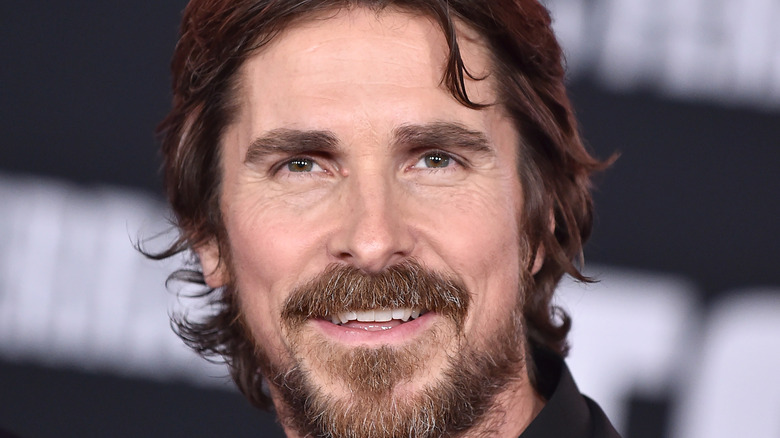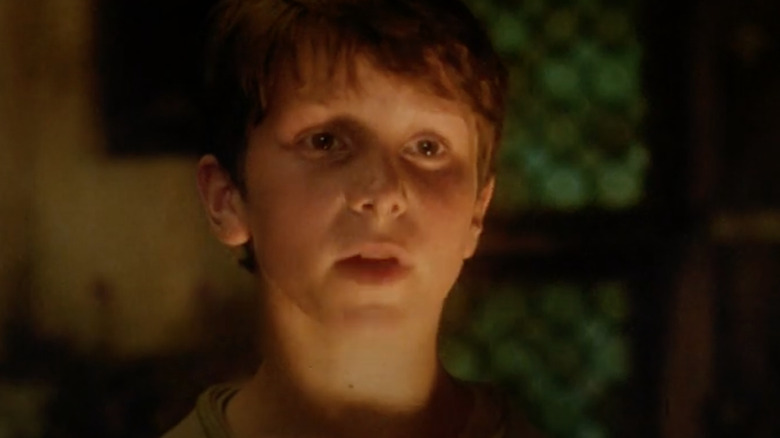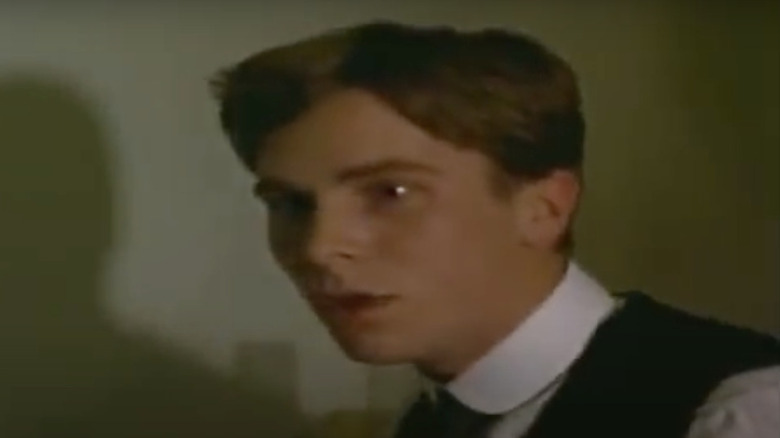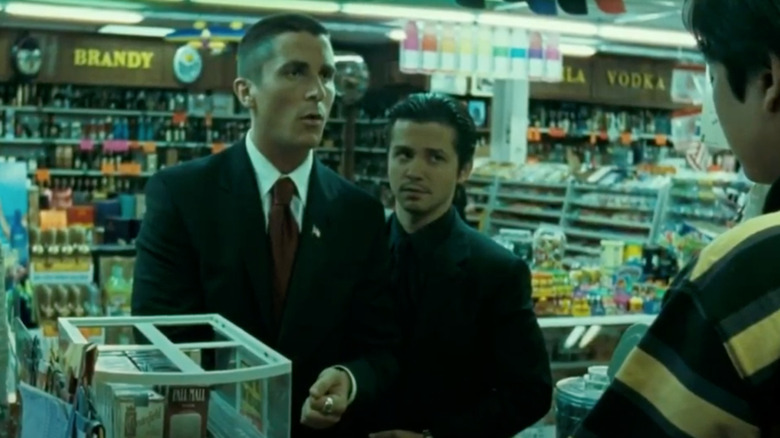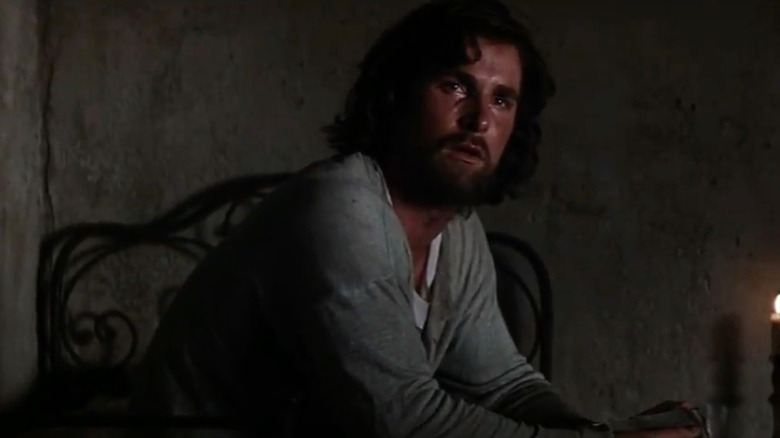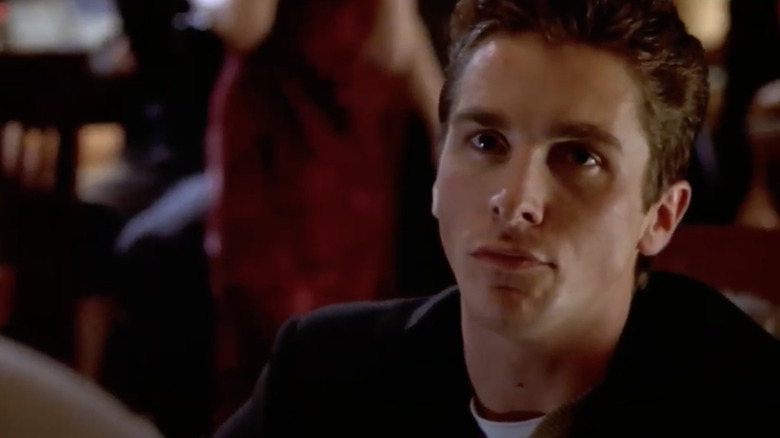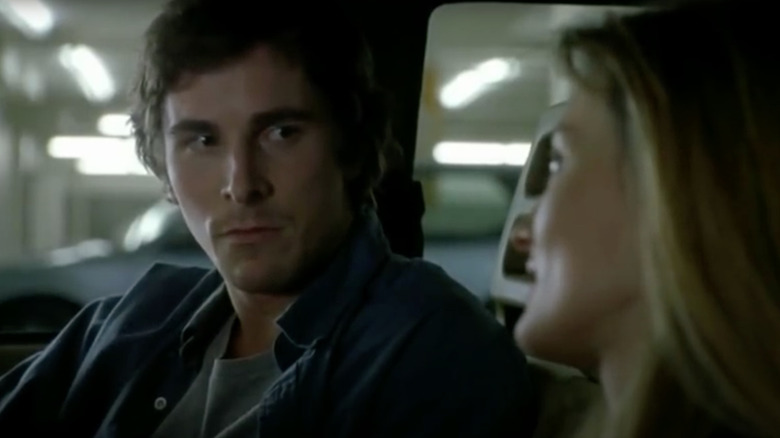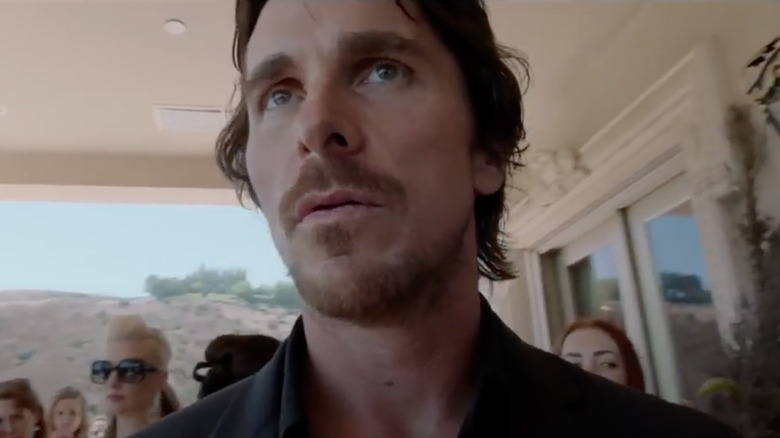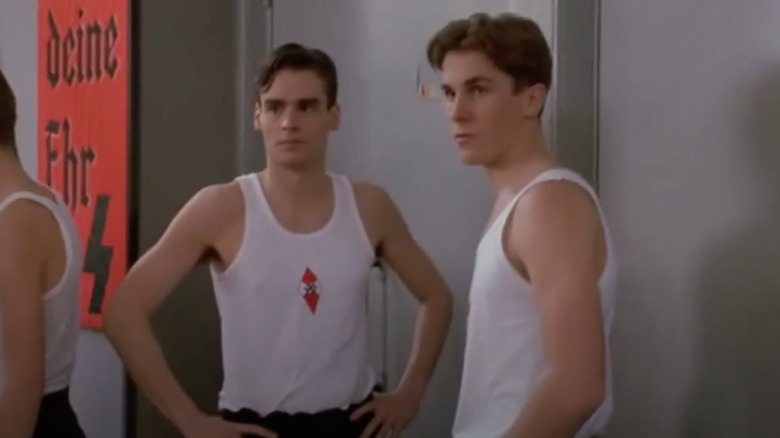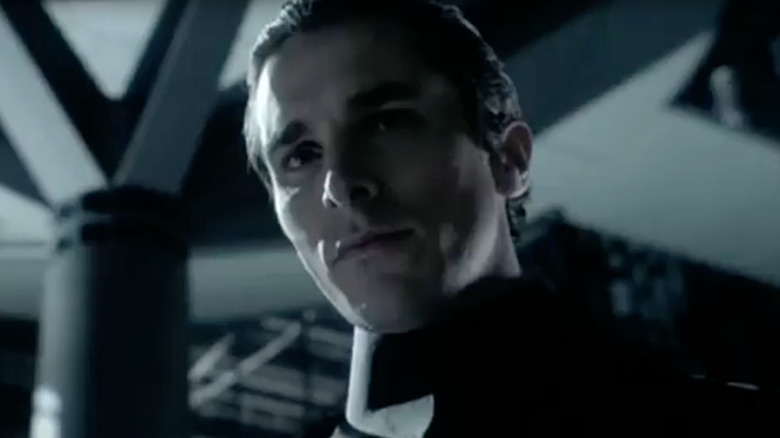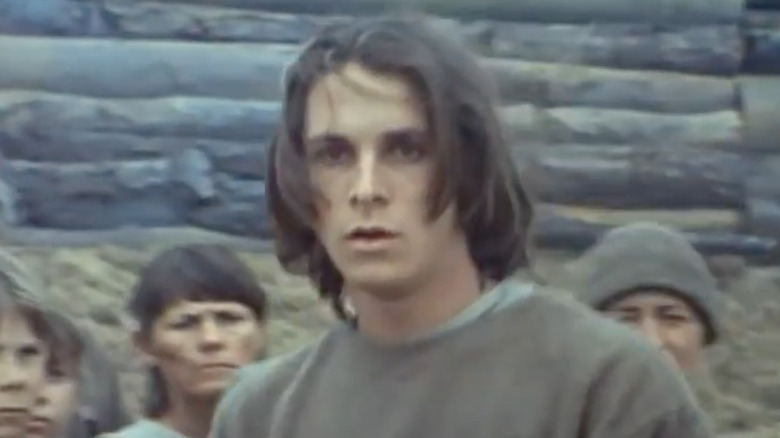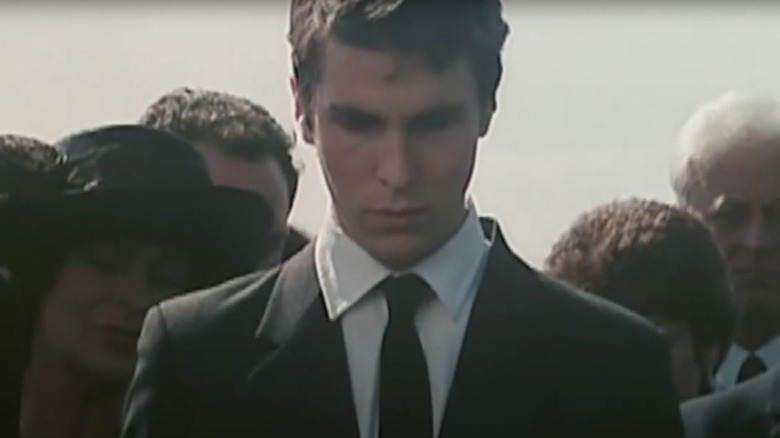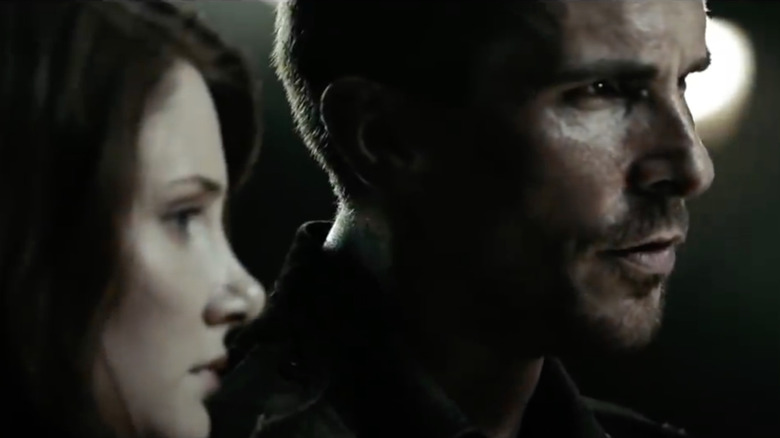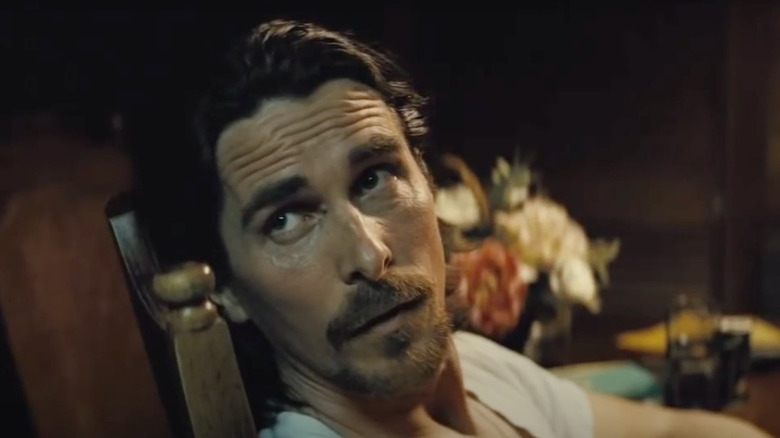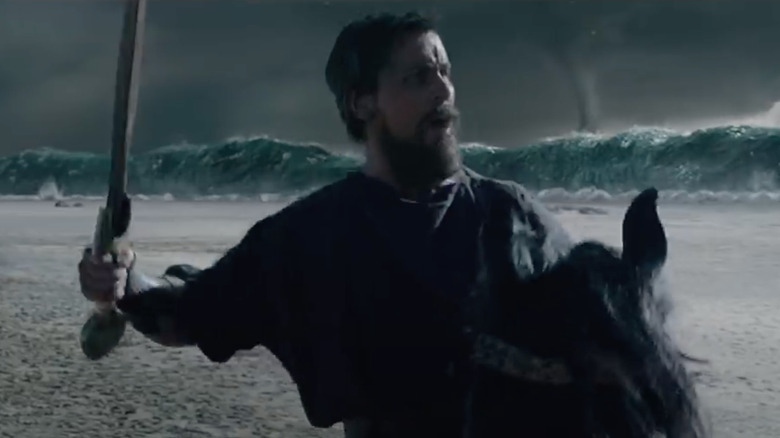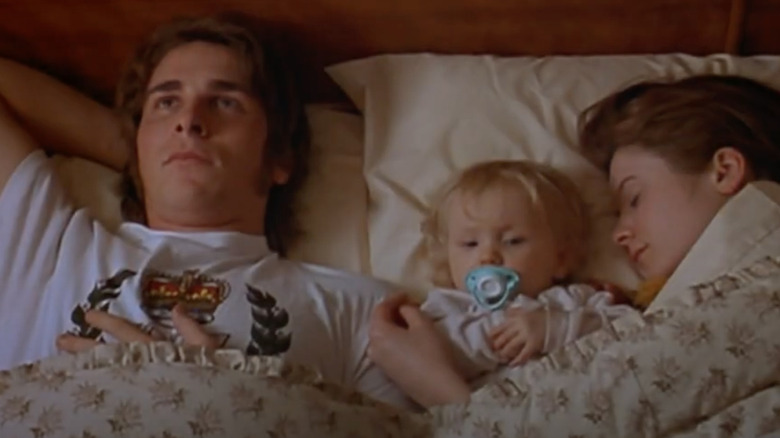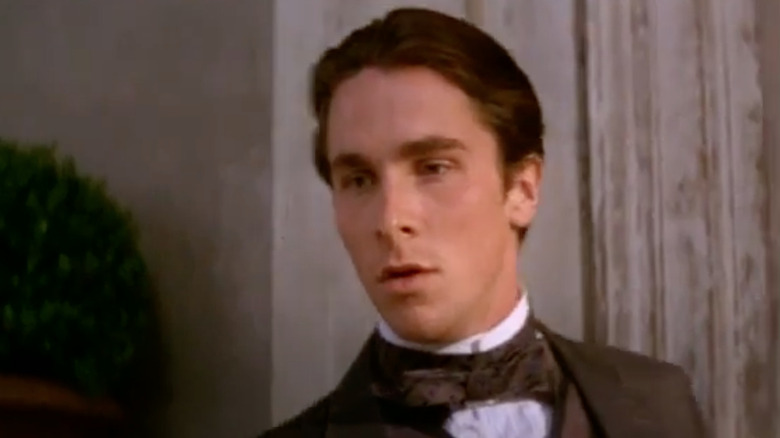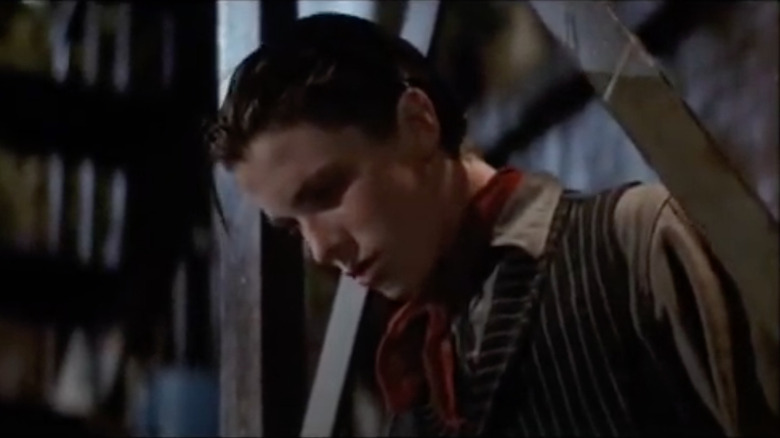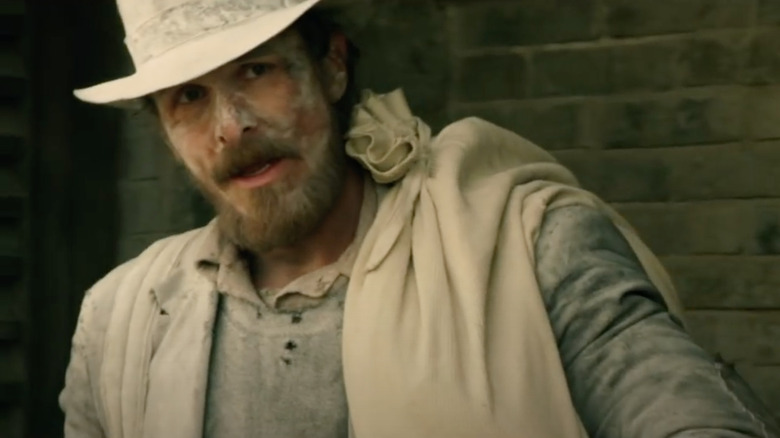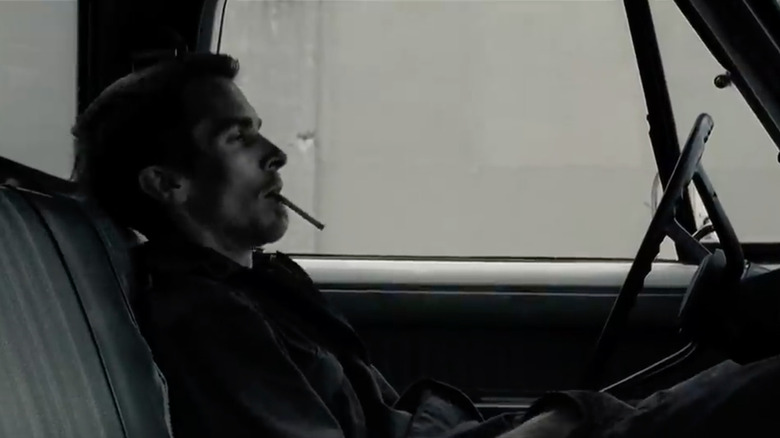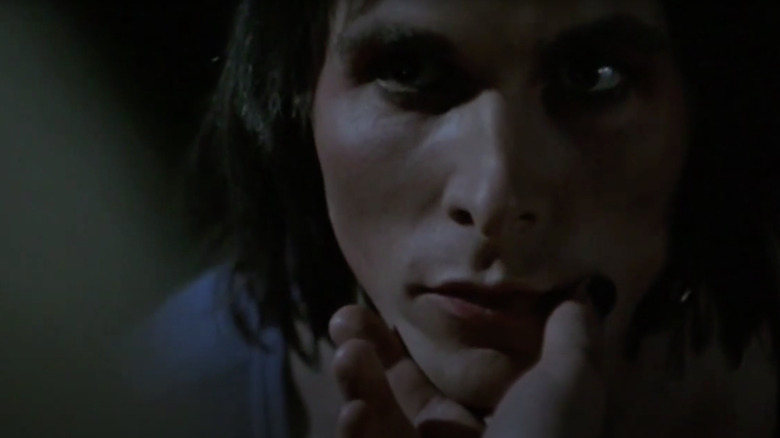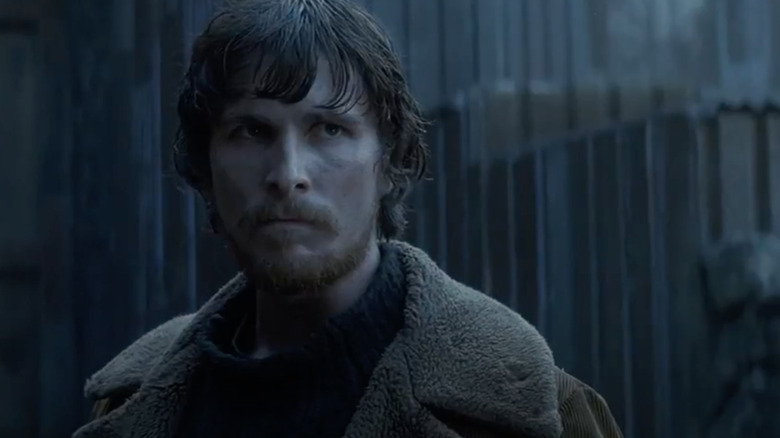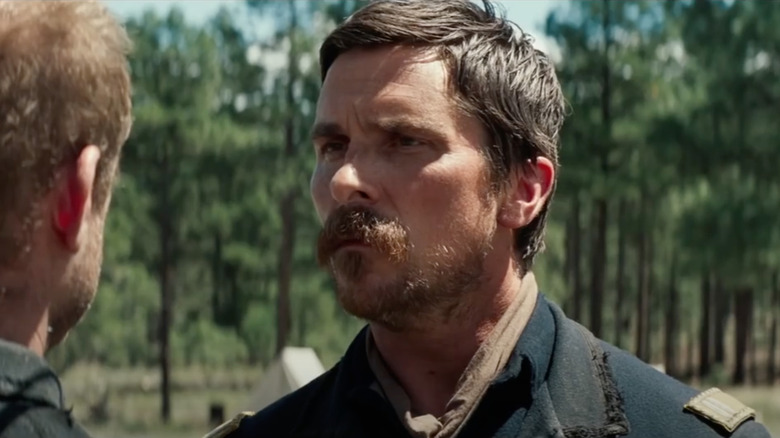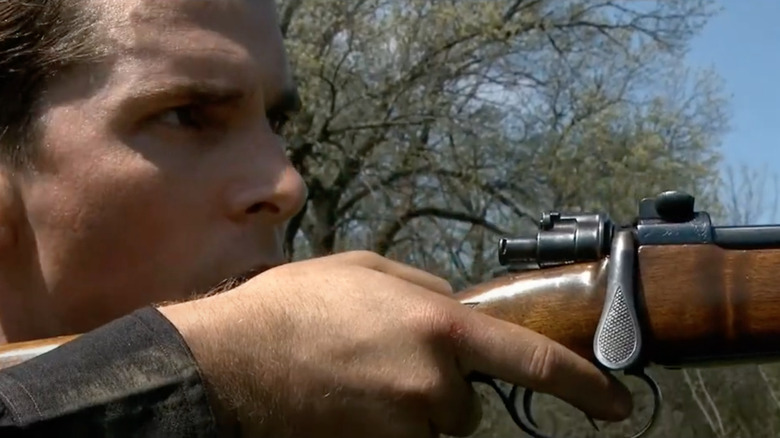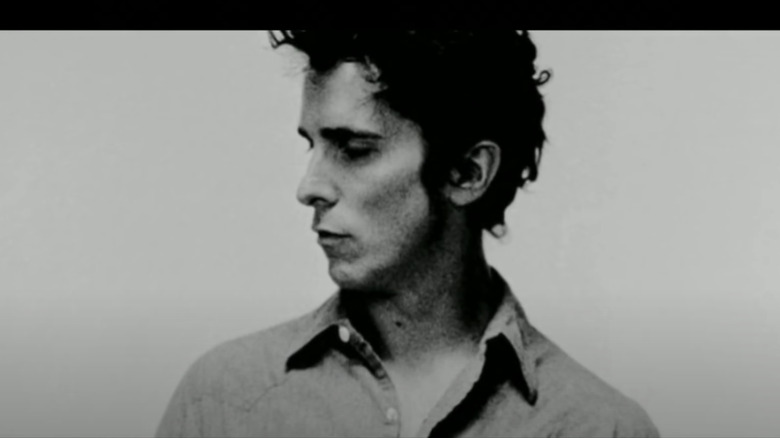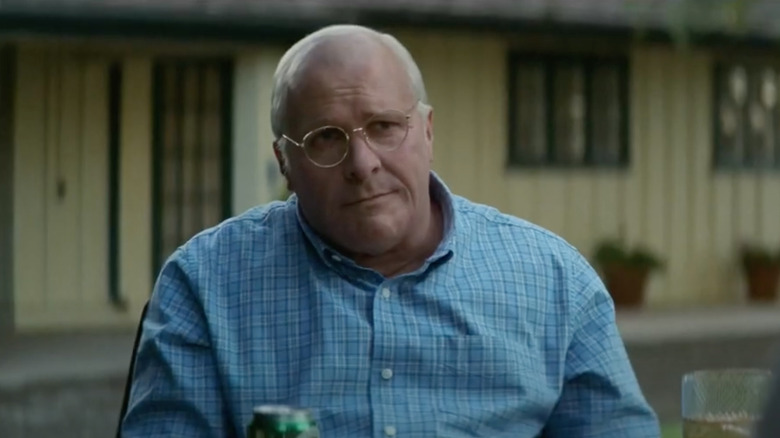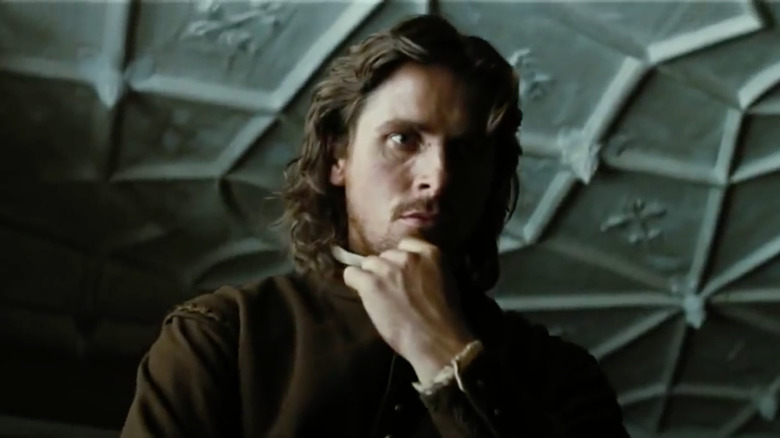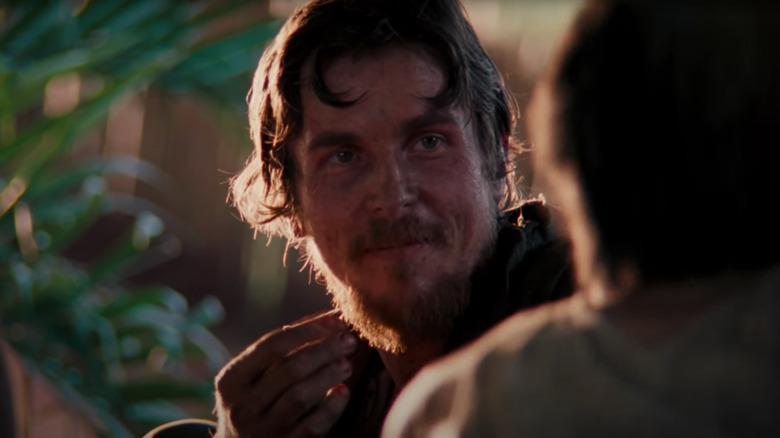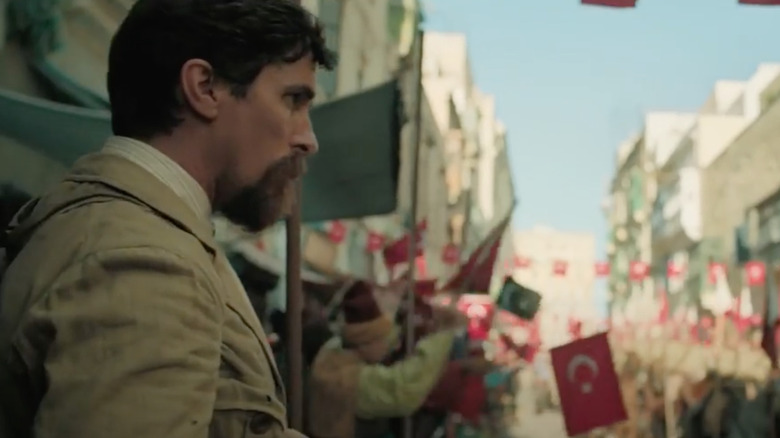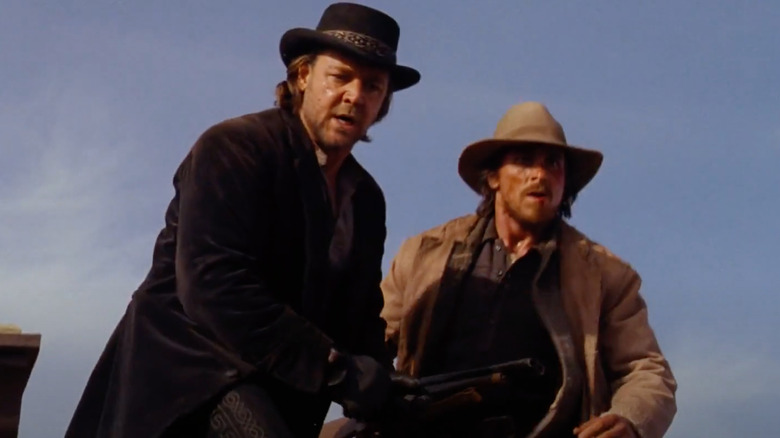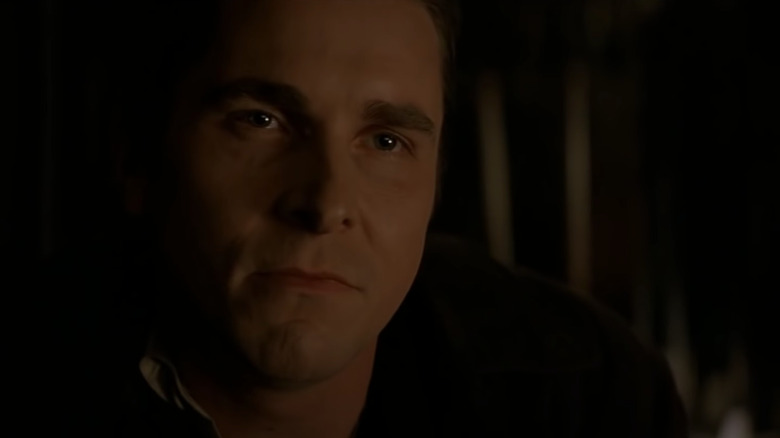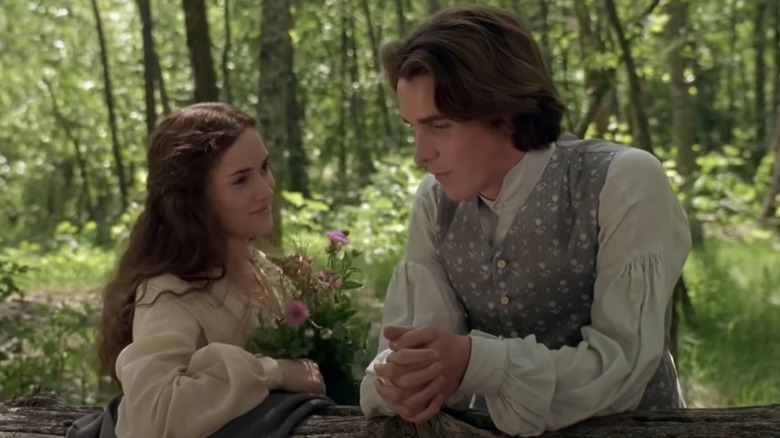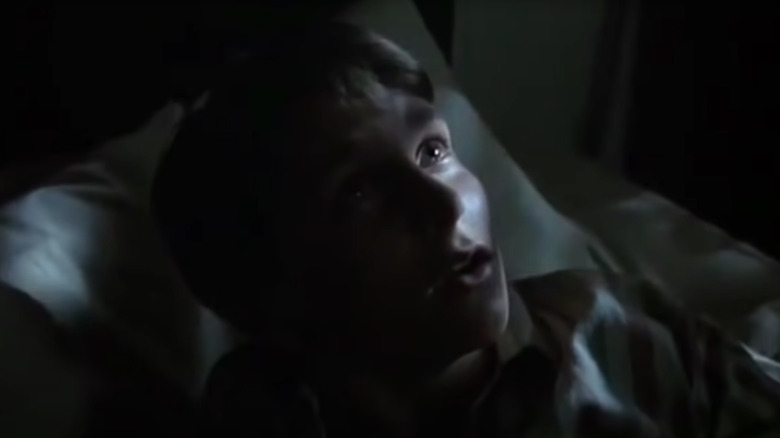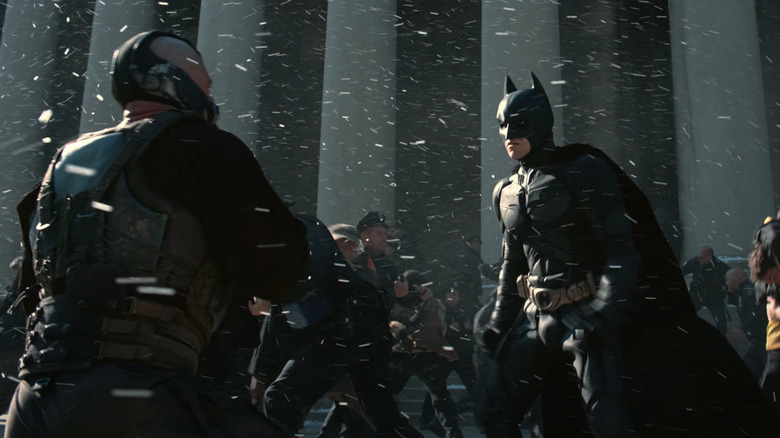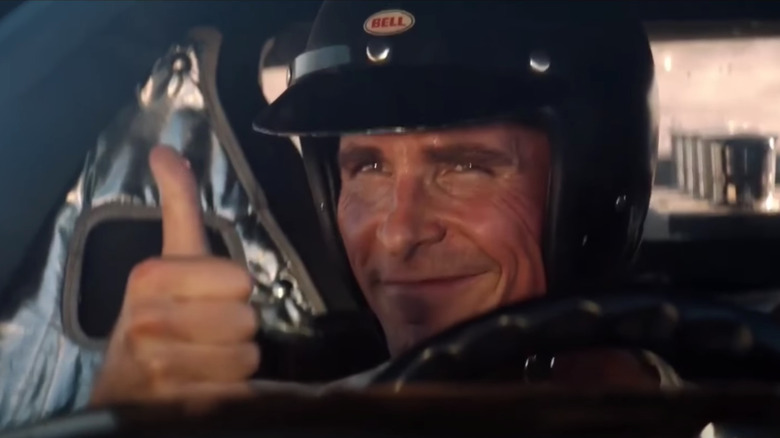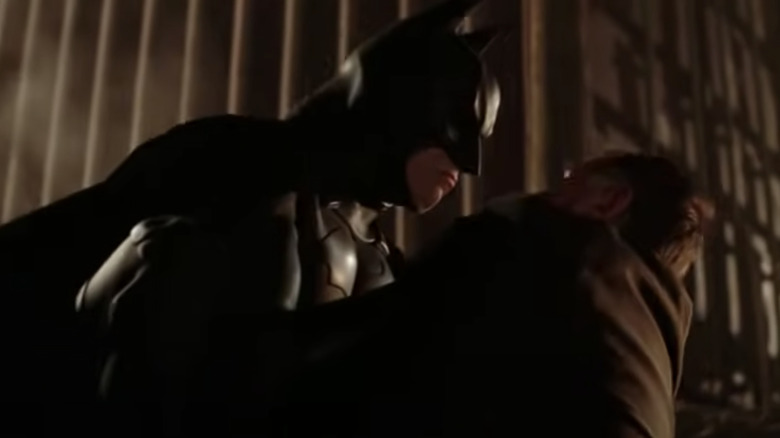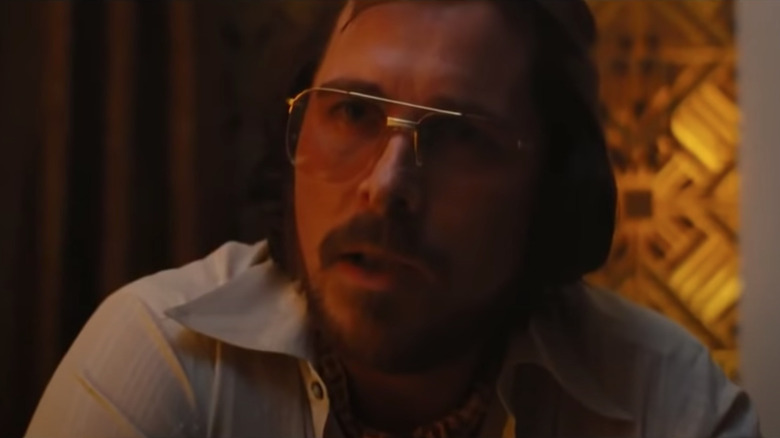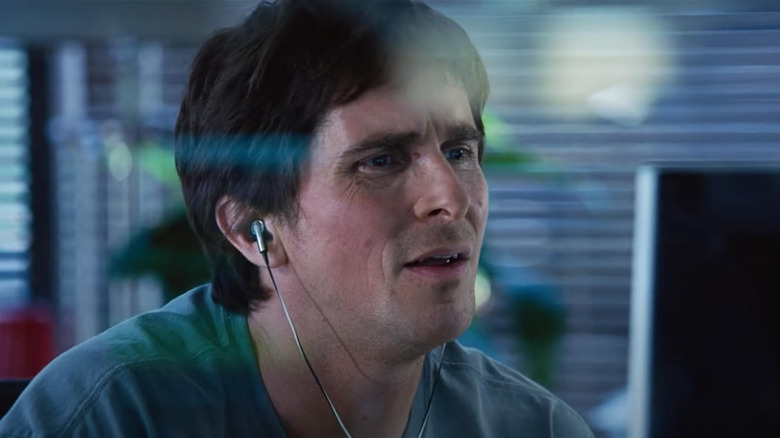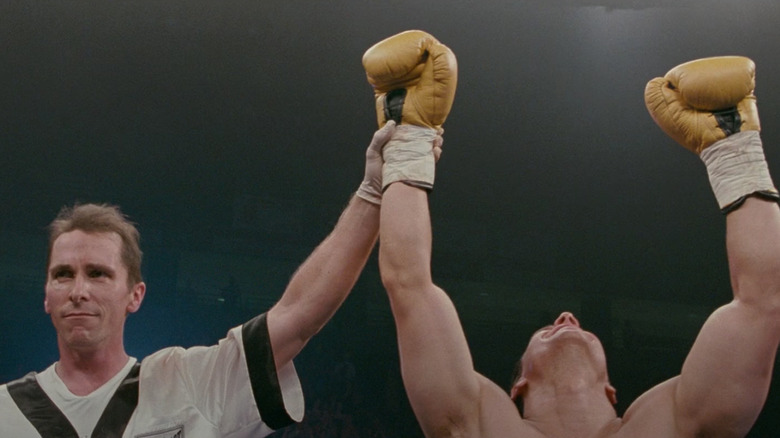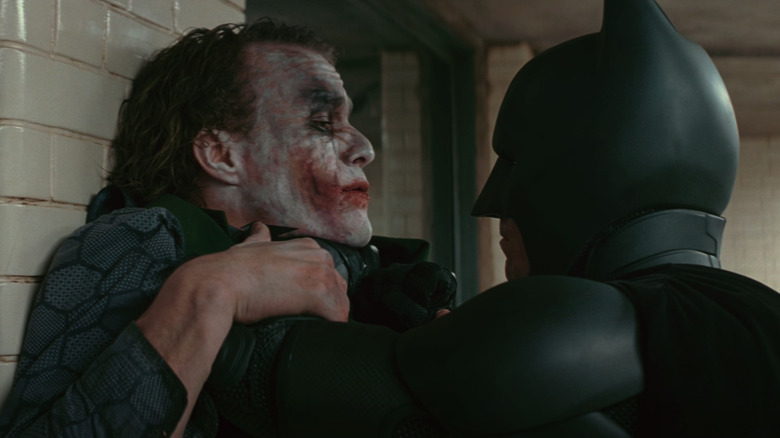Every Christian Bale Movie Ranked
Christian Bale is one of the most talented actors alive. Whether he's leaping off rooftops as Batman or hamming it up as Dick Cheney, he continues to impress with his diverse portfolio that mixes big-budget fare with smaller, character-driven roles. Indeed, at this stage in his career, Bale, an Academy Award winner and box office behemoth — his films have totaled over $4 billion worldwide — is at the top of every casting director's pick list, a status that certainly took some time to reach.
After becoming an overnight sensation in Steven Spielberg's 1987 epic "Empire of the Sun," Bale fought to find a place in Hollywood as an adult. Films such as "Newsies" and "Swing Kids" stunk up the box office, while roles in "American Psycho" and "The Machinist" netted plenty of critical acclaim — mostly for Bale's physical commitment to the performances — but still left him on the outside looking in. Luckily, Christopher Nolan recognized Bale's potential and cast him as Batman in 2005's blockbuster "Batman Begins," launching him into superstardom.
Since then, Bale has appeared in some of the most memorable films of our time, including "The Dark Knight," "The Fighter," "The Prestige," and "The Big Short." Truth be told, the man doesn't have many bad films to his name, which is quite impressive for a career spanning over three decades. But still, we strive to separate the great from the merely average, ranking his films from worst to best.
40. Mio in the Land of Faraway
"Mio in the Land of Faraway," based on the 1954 novel "Mio, My Son," by Astrid Lindgren, is one of those low-budget fantasies that makes one appreciate the quality of films like "The NeverEnding Story" that much more. Featuring Nicholas Pickard and an extremely young Christian Bale (in his first big-screen role), "Mio in the Land of Faraway" follows conventional fantasy tropes. A young boy is tortured by his aunt and uncle before being whisked away to a magical world where he, the Chosen One, must destroy an evil villain (Christopher Lee). But as directed by Vladimir Grammatikov, it lacks the lavish production values that could bring to life these fantasy elements.
Sure, there are ... interesting moments, such as when our hero, Bosse aka Mio, clings to the beard of a giant floating head and flies to the Land of Faraway. The film also features enough similarities to "Harry Potter" to make fans question whether the creators should open a lawsuit against J.K. Rowling. Regardless, "Mio in the Land of Faraway" is simply too weird and hokey for mainstream audiences to appreciate.
39. The Secret Agent
A comical misfire, writer-director Christopher Hampton's 1996 thriller "The Secret Agent," based on the novel by Joseph Conrad, wastes its talented cast on a rudimentary plot that suffers from flat directing, choppy editing, and a complete lack of suspense.
Starring Bob Hoskins, Patricia Arquette, Gérard Depardieu, Jim Broadbent, Christian Bale, and Eddie Izzard, the plot revolves around a Russian double agent-turned-pornographic bookseller (Hoskins), who is tasked with committing acts of terrorism around 1880s London — an act that jeopardizes his marriage and puts his intellectually disabled brother-in-law (Bale) at risk.
There are elements of "The Secret Agent" that work. The period setting is brought to life in vivid detail, and the smoky, dimly lit London streets carry their usual eeriness. But the performances are mixed at best, with Hoskins and Arquette doing what they can with the material given. Conrad's novel was also adapted for the screen in 1936 by Alfred Hitchcock, creating the classic "Sabotage" — they should have left well enough alone.
38. Harsh Times
Reviews of David Ayer's crime drama "Harsh Times" seem to fall into two camps: those that think it's a dope action film, and those that absolutely hate the film with a fervid passion. There's a case to be made for both sides as there are likely many who can relate to the grim, unrelenting inner-city world inhabited by Christian Bale's brooding and angry Jim, while others may find the violent shenanigans a tad overcooked.
At any rate, if you adore the gritty urban style of Ayer's other works — namely, "Suicide Squad," "Fury," "Street Kings," "Bright," and "The Tax Collector" — then "Harsh Times" might be your jam. The film packs plenty of action and testosterone-fueled standoffs into its two-hour runtime to keep the plot about two lifelong friends navigating the mean streets of Los Angeles moving along at a brisk pace, even if the script doesn't have much to say about its subject matter. A reliance on unlikeable, one-note characters, grungy cinematography, and extreme violence likely render the film inaccessible for most audiences.
37. Captain Corelli's Mandolin
"Captain Corelli's Mandolin," a wartime epic steeped in romance from director John Madden ("Shakespeare in Love") checks all the necessary boxes to illicit swoons from audiences and critics alike. Alas, Madden's film, based on Louis de Bernières's much-loved 1994 novel, fails to capture the complexities of its source material, resulting in a meandering, poorly acted piece of Oscar bait that's as far removed from "The English Patient" — a film "Captain Corelli's Mandolin" desperately tries to emulate — as Nicolas Cage's Italian accent is from authenticity.
Set on the Greek island of Cephalonia during World War II, "Captain Corelli's Mandolin" follows the beautiful Pelagia (Penélope Cruz) and her romantic fling with Italian captain Antonio Corelli (Cage), whose love of music, specifically opera, endears him to the feisty young woman. The only problem is that Pelagia promised herself to another man, Mandras (Christian Bale), shortly before he left to fight Mussolini's forces in Albania, resulting in a contrived and melodramatic love story that regrettably calls to mind Michael Bay's "Pearl Harbor."
The war scenes are effective, and Bale delivers a strong performance as the battle-scarred odd man out, but Cage and Cruz lack the spark (and accents) required to sell the romance, preventing "Captain Corelli's Mandolin" from connecting with audiences.
36. Shaft
With "Shaft," we get the dream casting of Samuel L. Jackson as the titular detective — an update of the original 1971 "Shaft" starring Richard Roundtree — and a solid director in John Singleton, who guided the critically acclaimed "Boyz N the Hood" a decade earlier. Unfortunately, Jackson's talents (and, by extension, Singleton's) are wasted on an undercooked plot centered around Christian Bale's yuppie villain that foolishly eschews Shaft's roguish charm in favor of a convoluted generic action vehicle catered to the masses.
When a young Black man is severely beaten by the son of a real estate tycoon, Detective John Shaft must track down the only witness to the crime (Toni Collette) whilst navigating the seedy underbelly of New York. Featuring a cast that also includes Vanessa Williams, Jeffrey Wright (in an early memorable turn), Busta Rhymes, and Dan Hedaya, "Shaft" has all the talent to deliver a rock-solid crime drama, but resorts to routine action tropes and one-note characterizations that keep it from ever achieving its full potential.
35. Laurel Canyon
Lisa Cholodenko's "Laurel Canyon" has an interesting premise and a solid cast, but it just can't figure out what to do with them. The film follows couple Sam (Christian Bale) and Alex (Kate Beckinsale), whose relationship begins to deteriorate once they move in with Sam's free-spirited mother Jane (Frances McDormand). Sam engages in overtly sexual conversations with a woman at his work (Natascha McElhone) while Alex dives headfirst into Jane's party-centric lifestyle and even begins a semi-romantic fling with Jane and her much younger beau Ian (Alessandro Nivola). Will Sam and Alex forgo their relationship for their newly discovered passions?
"Laurel Canyon" might have worked as a dark satire, but it spends far too much time lingering on mopey characters engaging in mopey (read: deep) conversations about their miserable lives. The film works best when it focuses on McDormand's sexually charged Jane, who teases and allures those around her without breaking a sweat. It's a pitch-perfect performance in an otherwise underwhelming film.
34. Knight of Cups
At this point, it's fair to say if you love Terrence Malick's abstract approach to film, then you'll likely appreciate anything the auteur does. If you're not particularly drawn to his fascination with disconnected images, reflective voiceovers, and plotless structures, then a film like "Knight of Cups" is probably best left alone.
"Knight of Cups" stars Christian Bale as a Hollywood screenwriter seeking to find the purpose behind his hollow privileged life, which he shares with an assortment of beautiful women, including Cate Blanchett and Natalie Portman. It owes more to "Tree of Life" than "Badlands," which just means it's a ponderous experience that will leave many desperately trying to decipher the meaning behind all the pretty pictures.
As usual, Emmanuel Lubezki stuns with his astonishing cinematography that manages to turn seedy Los Angeles into a playground brimming with beauty. "Knight of Cups" certainly leaves a mark and bears all the hallmarks of its visionary director, but you may grow frustrated with its unconventional style and lack of interesting characters (beyond Brian Dennehy's obtuse father figure), finding yourself longing for the days when Malick at least tried to tell a comprehensible story.
33. Swing Kids
"Swing Kids" has its heart in the right place, but is much too melodramatic and blind to its own subject matter to warrant anything more than a cursory glance from viewers.
Set in Hamburg just before the outbreak of World War II in 1939, a group of German boys defy Nazi rule by taking part in secret swing dancing sessions at night. Director Thomas Carter does a commendable job delivering the required dancing sequences, swung to the tunes of Benny Goodman and Count Basie, but can't decide if he's making the World War II equivalent of "Footloose" or a deeply profound drama about the dangers of fascism. His camera lingers more on the talented footwork of Robert Sean Leonard and Christian Bale than on the violence committed by the Brownshirts, leaving audiences to wonder, as Roger Ebert so eloquently observed, if these kids "hate Hitler Youth lads because they were Nazis, or simply because they didn't swing."
32. Equilibrium
There are those who compare Kurt Wimmer's "Equilibrium" to "The Matrix," with its heady themes regarding the nature of choice and emphasis on martial arts action. Don't believe them. This sci-fi tale certainly gives audiences plenty to chew on, but lacks the groundbreaking scope of the Wachowski epic, seeming more like a cheap knockoff of better films than an original production.
"Equilibrium" takes place in a post-WWIII dystopian future where a totalitarian government has crafted a means to suppress human emotion. Devout Cleric John Preston (Christian Bale), spends his days hunting down contraband items that could be used to elicit emotion — namely, paintings, books, and decorative arts — until he skips his medication one morning and subsequently becomes a "Sense Offender." Eventually, John seeks to eradicate the government by joining forces with the rebellion, leading to a series of standoffs and fight scenes that, while visually stylish, become increasingly tedious as the film labors on.
Criticisms aside, Bale is quite good in the film. There's a great bit where he weeps while listening to Beethoven for the first time, and other moments where the actor shows off a natural knack for superhero action that likely played a big part in landing him the role of Batman in Christopher Nolan's "Batman Begins." His performance is worth the price of admission, though you may wish the surrounding film matched the star's talent.
31. Royal Deceit
Trailers boasted how "Prince of Jutland" (also released under the title "Royal Deceit") from Academy Award-winning director Gabriel Axel ("Babette's Feast"), tells the "true tale" of William Shakespeare's "Hamlet," itself based on the Danish legend of Prince Amleth. And while the 1994 film features the type of treachery and, ahem, deceit found in the Bard's famous play, it isn't quite as interesting as one would hope, especially given the talent on display.
Perhaps it's asking too much for a film boasting the likes of Gabriel Byrne, Helen Mirren, Christian Bale, Brian Cox, Kate Beckinsale, Andy Serkis (in his first role), and Tom Wilkinson to amount to more than a by-the-numbers action epic, but, alas, "Prince of Jutland" can't overcome its budgetary limitations to produce the scope needed to make the story really click. It's a shame, because the script, written by Axel and Erik Kjersgaard, is quite good, and the characters are appropriately complex. Bale, for what it's worth, makes for a formidable hero, but at this stage in his career, lacks the presence needed to truly sell his tragic tale.
30. All the Little Animals
A fascinating fable with complex characters and an eye towards the peculiar oddities lingering on the outskirts of society, 1998's "All the Little Animals" follows Bobby (Christian Bale), a young man forever plagued with an impairment caused by a head trauma at a younger age. He befriends the peculiar but genial Mr. Summers (John Hurt), who spends his days cleaning up dead animals along the side of the road. Mr. Summers has a strong empathy for animals, and Bobby shares his compassion, even going so far as to drive a truck off the road (killing the driver) in order to spare a fox from certain death. The pair go on odd little adventures — at one point they sabotage a lepidopterist for killing moths — and form an unlikely bond that comes to a head when Bobby's violent stepfather (Daniel Benzali) emerges, demanding control of the family business left behind by his late mother.
Directed by Jeremy Thomas, "All the Little Animals" is certainly not for casual viewers. It's a little too dark for children and too off-kilter for mainstream adult audiences, but the performances are solid and the story interesting, even if it falls by the wayside in its melodramatic third act.
29. Terminator Salvation
As an action film, McG's "Terminator Salvation" delivers the goods. There's spectacle aplenty and the occasional whiz-bang moment, such as an extended "Mad Max" style chase through a desert featuring vehicles that can shift, leap, and fly like Transformers. McG demonstrates a knack for staging high-octane razzle-dazzle, but falters in the human department.
Led by Christian Bale, who doubles down on the raspy Batman voice, "Terminator Salvation" takes us to the early days of the future war between man and machine from "Terminator," "Terminator 2: Judgment Day," and "Terminator 3: Rise of the Machines." Bale plays John Connor, the prophesied messiah, only this war isn't what he or his mother (Linda Hamilton) expected. The machines are creating terminators like Sam Worthington's half man/half machine Marcus Wright that are much harder to detect. As the war grows more intense, John reluctantly teams up with Marcus to take down Skynet and change the future once and for all.
The film is enjoyable in and of itself, but fails as a "Terminator" sequel both stylistically and narratively. An alternate ending saw John Connor fall to his robot foes, only to have his skin attached to Marcus' robotic skeleton — a twist that would have provided a much-needed jolt to the stale franchise.
28. Out of the Furnace
Scott Cooper's "Out of the Furnace" frustrates more than it entertains. You can see the film Cooper wants to make — a story about a man navigating an America undone by calamitous events such as the economic crash of 2008, and a revenge thriller about a blue-collar worker doing his best to shield those he loves from the turbulent world around them. But as it is, the film presents a slow-burning character drama in which Christian Bale's Russell Baze endures enough suffering to warrant his Jesus-inspired look, before finally setting out to battle Woody Harrelson's ruthless Harlan DeGroat in order to save his war veteran brother Rodney (Casey Affleck).
Considering the talent involved, notably Zoe Saldana, Forest Whitaker, and Willem Dafoe, one would expect a stronger film. Instead, "Out of the Furnace" moves at a glacier pace and doesn't have much to say once it arrives at its destination.
27. Exodus: Gods and Kings
Ridley Scott's biblical epic, "Exodus: Gods and Kings," isn't nearly as bad as many make it out to be, but that doesn't make it a good film either. Strong visuals and a few eye-popping action scenes aren't enough to compensate for stilted acting, questionable casting, and an inane script that tries its hardest to ground the story of Moses in something akin to reality.
"Exodus" puts Christian Bale in the role of Moses, who is called by God to free the Israelites from bondage under the rule of the evil pharaoh Ramses (Joel Edgerton). Scott employs fantastic VFX to show off the fabled 10 plagues and the wondrous parting of the Red Sea — here presented as a random act of nature after a meteor falls from the heavens and causes a tsunami that sucks in the waters long enough for Moses and his people to cross.
It's a bold move on behalf of Scott, akin to Darren Aronofsky's atheistical exploration of Noah's Ark in "Noah." Rather than a tale about a man of God freeing his people with wondrous miracles, this Moses is more complex. His hallucinogenic visions cause his followers, including Aaron Paul's Joshua, to question his sanity.
26. Metroland
In "Metroland," a young man named Chris (Christian Bale) begins to wonder if his current life — that of a suburban father married to a perfectly harmless English woman (Emily Watson) — is the one he truly desires. The film takes us back to Chris' youth, where he enjoyed a life of freedom as a photographer, having trysts with a provocative French woman (Elsa Zylberstein) and traveling with his friend Toni (Lee Ross). At a certain point, Chris made the decision to settle into a middle-class existence, while Toni continued his single life of adventure as a bohemian poet. A reunion between the two friends raises questions about their life choices.
Wonderfully acted and occasionally funny, "Metroland" doesn't have the depth of, say, "American Beauty," but it paints a captivating portrait of marriage many will likely relate to, even if it resorts to oversimplification in its final act. "Who wants fast food when you can eat at the Ritz," Chris tells his wife after a passionate (and much needed) roll in the sack, suggesting that a family life, while occasionally bumpy, is better than Toni's lonely existence.
25. A Midsummer Night's Dream
William Shakespeare's classic play, "A Midsummer Night's Dream," gets a modern makeover complete with an all-star cast that includes Kevin Kline, Sam Rockwell, Roger Rees, Stanley Tucci, Rupert Everett, Michelle Pfeiffer, Calista Flockhart, and Christian Bale. Set in 19th century Tuscany, "A Midsummer Night's Dream" is mostly a collection of silly misunderstandings that result from the meddling of the sprite Puck (Tucci) and his master Oberon (Everett) in the affairs of four bickering lovers.
Director Michael Hoffman bathes his adaptation in green and gold hues and takes advantage of the lush scenery afforded by the romantic period. Composer Simon Boswell fills the soundtrack with classic Italian music and an appropriately lavish (and, at times, silly) score simmering with opulent themes and melodies. The cast is clearly having a blast hamming it up in their respective roles — Kline has the most fun as Nick Bottom — and the whimsical nature of Shakespeare's classic play remains mostly intact.
Still, the picture adds up to less than the sum of its parts — a visually splendid, dramatically meager retelling of a classic tale.
24. Newsies
In many ways, Disney's 1992 musical "Newsies" should have been a sure-fire hit. Boasting an incredible array of songs written by the great Alan Menken and J.A.C. Redford, and starring Christian Bale, Bill Pullman, and legendary actors Ann-Margret and Robert Duvall, the handsome production made all the right moves, but, sadly, failed to ignite the box office. The Kenny Ortega-directed pic went on to gross just $2.8 million against a $15 million budget, making it one of the bigger bombs of Disney's '90s live-action era.
What went wrong? For starters, at 121 minutes, "Newsies" is far too long, particularly considering its story — centered around the Newsboys' Strike of 1899 — and characters aren't that engaging. And while the songs are great, the overarching style of the film doesn't translate as well to the big screen as it does to the stage, which is probably why the Broadway musical has garnered considerably more acclaim.
Years later, reviews have been more kind to "Newsies," with its story about the power of the press resonating more than ever with modern viewers. Though its sluggish pacing, stagey aesthetic, and clunky storytelling might be too much for audiences to overlook.
23. The Flowers of War
"The Flowers of War" takes a real-life event — the Nanjing Massacre, during which the Imperial Japanese Army invaded the Chinese capital and killed roughly 300,000 civilians, including women and children — and spins it into an effective, beautifully shot yarn about a group of schoolgirls who take refuge in a cathedral to avoid the atrocities of their invaders.
Christian Bale (whose casting drew a heap of scrutiny from critics) stars as John Miller, a drunken mortician who inexplicably gets caught up in the surrounding events. After experiencing a change of heart, Miller eventually tries to help the young women escape their predicament with the help of an orphan boy named George (Huang Tianyuan), leading to an intense, but moving, finale.
Based on a novella "13 Flowers of Nanjing," written by Geling Yan, itself inspired by the diary of Minnie Vautrin, "The Flowers of War" offers a unique look at one of human history's most tragic events, and boasts solid performances from Bale and its largely inexperienced cast of women. That it's told through the eyes of an American as opposed to one of its many female characters is an unfortunate decision. But If you can forgive that egregious error in judgment, there's plenty to admire in the lavish production.
22. The Machinist
Christian Bale lost 62 pounds for Brad Anderson's creepy psychological thriller "The Machinist," in which the actor portrays Trevor Reznik, a man who is struggling to cope with unresolved trauma.
The film itself, written by Scott Kosar, is interesting enough, but much too morose and mean-spirited to really connect with. And while an undercurrent of humor occasionally offsets the pitch-black tone, the rest of the film lacks the subtlety and ingenuity that made Christopher Nolan's similarly designed "Memento" such an enthralling tragedy.
Of course, most viewers will likely be too distracted by Bale's sickly physique to pay much attention to the film's overt symbolism or style. Truly, the actor's physical transformation and unconstrained performance are more than worth the price of admission ... even if the film itself isn't quite up to snuff, and Bale's rapid weight loss raises questions about the health risks associated with actors going too far for their craft.
21. Velvet Goldmine
The glam rock scene comes to startling life in "Velvet Goldmine," Todd Haynes' visually splendid but narratively unfocused tribute to the world of David Bowie, Bryan Ferry, and Iggy Pop. Borrowing cues from the likes of Orson Welles' "Citizen Kane" as well as documentaries and music videos of the '70s era, Haynes paints a colorful palette of the sex-fueled life of a rock star and the problems that go hand-in-hand with fame.
Christian Bale stars as Arthur Stuart, a reporter tasked with locating former pop icon Brian Slade (Jonathan Rhys Meyers) after the star faked his own death on stage years before and disappeared from the public consciousness. Arthur interviews former members of Brian's entourage, including his former lover Curt Wild (Ewan McGregor) and his ex-wife Mandy (Toni Collette), to better understand the man behind the musician.
"Velvet Goldmine" dives headfirst into this captivating universe of unconventional sex, cross-dressing, and public unrest, though its shotgun approach to the material and unconventional story structure mean that the film often frustrates more than it thrills.
20. Reign of Fire
Audiences largely ignored the dragon-slaying extravaganza "Reign of Fire" when it was released in 2002, resulting in a meager $82.2 million worldwide box office haul. But they've since warmed up to the film, largely due to its radical plot and rock star cast.
Starring Matthew McConaughey, Christian Bale, and Gerald Butler (all pre-superstardom), "Reign of Fire" follows a group of survivors in their battle to retake the world from a horde of nasty dragons: A task easier said than done, as supplies and morale are low. Luckily, these dragons rely on a single male for reproduction, which means our heroes, led by the soft-spoken Quinn (Bale) and the much more abrasive Van Zan (McConaughey), just need to kill the alpha in order to wipe the entire dragon population from the face of the Earth.
Owing much to the 1981 fantasy "Dragonslayer" and George Miller's "Mad Max" trilogy, "Reign of Fire" entertains as a testosterone-driven action movie, even if it occasionally takes itself and its ridiculous premise far too seriously.
19. Hostiles
In "Hostiles," Christian Bale stars as embittered U.S. Army captain Joseph Blocker, who must escort a dying Cheyenne chieftain (Wes Studi) to his tribal lands in Montana. The catch is that each man carries venomous hate for the other stirred by the United States' ongoing conflict with Native Americans, and they must set aside their differences to survive the perilous journey laid out before them.
As directed by Scott Cooper, who also worked with Bale in "Out of the Furnace," "Hostiles" is a slow-moving character study with a relentlessly bleak tone that might be off-putting for most viewers. The characters, while realistically rendered, don't offer much in the way of personality, while the numerous obstacles encountered during the trek aren't distinguishable enough from one another to leave much of an impact.
The sudden shift in tone during the finale mercifully results in something akin to a happy ending, but "Hostiles" may have benefitted from a little more subtlety. Unless, of course, the point was to de-romanticize the western frontier, in which case: Mission accomplished.
18. Public Enemies
A film about the F.B.I.'s pursuit of John Dillinger directed by Michael Mann and starring Johnny Depp, Christian Bale, and Marion Cotillard sounds like a slam dunk on paper. Yet, somehow, the final product fails to stir much excitement, resulting in a well-acted but meandering drama that fails to match the magnetic personality of its legendary subject.
Beginning in 1933, "Public Enemies" chronicles the F.B.I.'s exhaustive search for Dillinger during the height of his criminal campaign. The good guys are led by Melvin Purvis (Bale), a by-the-books agent personally appointed by J. Edgar Hoover (Billy Crudup) due to his mutual appreciation of modern methods to apprehend criminals. The bad guys are led by Dillinger (Depp), who sweeps across the nation robbing banks while earning celebrity status among the common folk.
Mann stages a handful of thrilling shootouts and depicts its 1930s period setting with startling detail. Still, "Public Enemies" amounts to an assortment of great scenes that never fully mesh to form a satisfying whole, and a film that pales in comparison to the director's 1995 classic "Heat."
17. I'm Not There
A fascinating cinematic experiment, Todd Haynes' "I'm Not There" attempts to offer insight into the life of legendary singer Bob Dylan via seven separate, intercutting storylines that each represent a different aspect of his enigmatic persona. The results aren't always fluid, but there's a brilliance in its approach to its subject matter that should not be overlooked.
Starring Christian Bale, Cate Blanchett, Marcus Carl Franklin, Richard Gere, Heath Ledger, and Ben Whishaw, "I'm Not There" employs nearly every cinematic trick in the book. Some segments are shot like a documentary, others like a traditional narrative film. Some are in color, others in black and white. All are spliced together in a way that makes for a jarring, but never confusing, viewing experience. And while some of the performances come across better than others — critics were particularly generous to Blanchett's Jude Quinn — each offers at least a cursory glance into Dylan's soul that, when taken together, effectively capture the complexity of his character.
16. Vice
"Vice" may not live up to the lofty standards of Adam McKay's critically acclaimed "The Big Short," but it's still a thought-provoking satire about former U.S. Vice President Dick Cheney. Starring a completely unrecognizable Christian Bale as Cheney, McKay weaves a narrative around his subject, showing his rise to power from humble lineman in Wyoming to serving alongside George W. Bush in the early 2000s.
While some may balk at McKay's unapologetic (and mostly fictional) depiction of Cheney, painted here as a ruthless politician with few (if any) redeeming qualities, there's certainly plenty of commentary surrounding U.S. politics and the individuals behind the curtains pulling the strings. As he does in "The Big Short," McKay utilizes bold and unique tactics to guide viewers through Washington D.C.'s treacherous waters, often with hilarious results.
Still, Bale's performance is the real winner here. Hidden beneath layers of prosthetics, the veteran actor looks and acts every bit like the Cheney who slunk behind President Bush so many years ago. Amy Adams and Steve Carrell also deliver pitch-perfect performances as Cheney's wife and Donald Rumsfeld respectively, while Sam Rockwell perfectly captures George W. Bush's affable dummy personality.
15. The New World
Terrence Malick lends his trademark visual style to this fanciful retelling of the story of Pocahontas (Q'orianka Kilcher) and her romantic (though mostly fictional) relationship with Captain John Smith (Colin Farrell) upon his arrival in America. The scenery is magnificent, the score by James Horner appropriately sweeping, but the messy film structure and lack of narrative pull keep "The New World" from reaching the glorious heights of Malick's best work.
Performances from the main cast, particularly Kilcher, Farrell, and Christian Bale — who co-stars as John Rolfe, Pocahontas' eventual husband — are solid, whilst cinematographer Emmanuel Lubezki's photography captures the beauty, dangers, and mystery of this new world. The ending scene in which Pocahontas succumbs to pneumonia and dies amidst a flurry of Malick's abstract imagery serves as a heartbreaking coda to "The New World."
14. Rescue Dawn
Christian Bale stars in Werner Herzog's real-life account of Lieutenant Dieter Dengler, who crash lands in Laos during the Vietnam War and is subsequently taken to a prison camp. There, he befriends other captives, Lt. Duane Martin (a sensational Steve Zahn) and Sergeant Gene DeBruin (Jeremy Davies), who have been in the camp for some time. The film chronicles the group's struggles to survive their harsh environment, where they suffer starvation and torture while plotting their escape.
Make no mistake, "Rescue Dawn" is a tough watch, but those who can stomach the torture and violence will discover a powerful film of courage and determination. As Dengler, Bale undergoes an incredible physical transformation — not as extreme as "The Machinist," but close — that lends to his captivating performance. And, as we've come to expect from the enigmatic director, Herzog takes advantage of the surrounding scenery to fully envelope his audience in a natural world bursting with beauty and death.
13. The Promise
A sweeping epic set amidst the Armenian genocide in 1915, "The Promise" was ignored by filmgoers — the film earned just $12.4 million against a $90 million budget when it was released in 2017 — and mostly shrugged off by critics, who rolled their eyes at the fictional love triangle. It's a shame, because "The Promise" is an extremely well-made film that deserves a second chance.
Starring Oscar Isaac, Charlotte Le Bon, and Christian Bale, "The Promise" follows medical student Michael (Isaac) and his love affair with dance instructor Ana (Le Bon) in the small Armenian village of Siroun, located within the Ottoman Empire. The only problem is that Ana is in a relationship with an American photojournalist (Bale), which naturally causes some tension amongst the trio. But then the world around them quickly devolves into war, and the group must put aside their personal matters to help their friends and loved ones survive.
As he did with "Hotel Rwanda," director Terry George crafts a powerful tale of survival amidst a violent, harrowing backdrop. Performances from the cast, particularly Isaac, are sensational, while the massive scope suggests the likes of "Lawrence of Arabia." The love story may be trite, but it merely serves as the window dressing for what amounts to an underrated film.
12. 3:10 to Yuma
The movie western gets a modern makeover in James Mangold's "3:10 to Yuma," an exciting yarn that follows the exploits of down-on-his-luck rancher Dan Evans (Christian Bale) and his attempts to deliver violent criminal Ben Wade (Russell Crowe) to justice. Along the way, the duo — along with a merry band of supporting characters played by Logan Lerman, Dallas Roberts, Alan Tudyk, and Kevin Durand, among others — encounter Wade's own gang, led by Ben Foster as the delightfully unstable Charlie Prince. Eventually, Evans and Wade develop a begrudging respect for one another throughout the arduous journey, leading to a brilliant showdown in the aptly named town of Contention.
Mangold delivers a gritty, modern fable about camaraderie, loyalty, and violence, featuring terrific performances from Bale and Crowe. While he tends to go overboard with the body count, particularly in the extended third act, he never loses sight of the wonderfully realized characters in this rugged western frontier.
11. The Prestige
In "The Prestige," two rival magicians engage in a deadly game driven by a dark obsession to outperform the other — a conflict that eventually goes too far, resulting in tragedy and death.
Hugh Jackman and Christian Bale star in this utterly fascinating character drama from Christopher Nolan that pours on so many twists and turns you practically need a diagram to understand its maze-like plot. Despite its massive length and slow pace, "The Prestige" is downright mesmerizing.
Jackman and Bale make for deliciously wicked adversaries, while Michael Caine supplies sturdy support as a conflicted stage manager stuck between the pair. David Bowie surprises in an extended cameo as real-life Nikola Tesla, who is given the task of creating real "magic" with his moody electric devices. Wally Pfister's cinematography dazzles, ushering us into and out of various time periods through the use of color, while Lee Smith expertly cuts the sprawling narrative in a manner that somehow makes Nolan's complex story structure easy to follow.
10. Little Women
"Little Women," based on the book by Louisa May Alcott, tells the story of the March sisters — Jo, Amy, Beth, and Meg — and their upbringing against a backdrop of the American Civil War. Each of the sisters' personalities contrasts (and often conflicts) with the others, with Winona Ryder's Jo emerging as a free spirit seeking a profoundly different life than the one typically granted to women of her ilk in 19th century New England. The film follows the March family, led by their mother Marmee (Susan Sarandon) as they struggle with life, love, and the tragedies of the era.
Co-starring Christian Bale as Laurie, a spirited young man whose presence impacts each sister in different ways, as well as Samantha Mathis, Eric Stoltz, and Gabriel Byrne, "Little Women" is a solid family film with strong performances from its cast, stunning production design, and a wonderful score by Thomas Newman.
9. American Psycho
Before he dealt with the delicate psychology of Bruce Wayne/Batman, Christian Bale portrayed the full-on psychopath Patrick Bateman in Mary Harron's complex dark comedy "American Psycho." Perhaps known more for its macabre set pieces than its actual narrative, "American Psycho" follows Bale's investment banking executive in 1987 New York as he navigates the corporate world while simultaneously leading a private life as a violent serial killer.
As the bodies pile up, there's a certain apprehension on our part to believe anything we're seeing. Are we witnessing the actions of a deranged killer, or the fantasies of a corporate tool whose success has led to a meaningless life full of meetings, dinner parties, and crippling materialism? That's for you to decide. And while some may balk at the extreme violence — at one point, a naked Bateman chases a victim with a chainsaw before laughing mercilessly at her demise — those who can stomach the journey may find plenty to discuss long after the credits roll.
8. Empire of the Sun
A 13-year old Christian Bale earned acclaim for his magnetic performance in Steven Spielberg's "Empire of the Sun," based on the semi-autobiographical 1984 novel by J.G. Ballard. The film centers around a wealthy British boy named Jim (Bale) whose privileged life with his parents in the Shanghai International Settlement is fractured following Japan's invasion of mainland China. Jim spends the intervening years in an internment camp in Suzhou, and the film chronicles his remarkable journey from boyhood to adolescence.
Often considered one of Spielberg's forgotten classics, reviews at the time were unfairly mixed, with many critics, including Roger Ebert, taking aim at the whimsical nature of the film. A closer examination reveals a captivating tale about a young boy whose dreams of flight often conflict with the harsh realities of life and war. "Empire of the Sun" is a sprawling epic with stunning cinematography by Allen Daviau and one of John Williams' most powerful scores.
7. The Dark Knight Rises
"The Dark Knight Rises" may not live up to its exhilarating predecessor, but it's still better than most other blockbusters. Christian Bale returns in the cape and cowl to take on Tom Hardy's Bane, who plots to — what else? — destroy Gotham City with a nuclear bomb. It's up to Batman to save the day, but, following a prolonged absence from fighting crime, does the Caped Crusader have what it takes to mend his broken psyche and stop this powerful new adversary?
Christopher Nolan certainly goes for broke with the final chapter in his "Dark Knight" trilogy, packing the film with enough chases and violence to keep thrill-seekers satisfied, while sprinkling in some real-world politics for good measure. And while the results are often exemplary, particularly in its first two acts, the big finale, in which Batman leads a legion of police officers against Bane's army, feels a little undercooked.
Performances from the cast, including newcomers to the franchise Anne Hathaway and Joseph Gordon-Levitt, are predictably solid, while much of the action is sensational. Hans Zimmer delivers another riveting score, and Wally Pfister's stunning photography dazzles. As third acts go, there aren't many that reach the heights of "The Dark Knight Rises."
6. Ford v Ferrari
James Mangold's rip-roaring true story about Carroll Shelby (Matt Damon) and raucous driver Ken Miles (Christian Bale) delivers the requisite thrills typically found in the racing formula, but takes its premise one step further by delivering a compelling narrative coated with a layer of sentimentality. "Ford v Ferrari" focuses on Shelby and Miles' often contentious relationship leading up to the 1966 "24 Hours of Le Mans" race in France, where Ford Motor Company famously dueled Enzo Ferrari with their GT40 MK II design.
The race itself is fascinating in its own right, but Mangold is more interested in the battle within the battle, where scummy marketers and pompous businessmen like Tracy Letts' Henry Ford II delegate from offices far removed from the race track, often clashing with Shelby's blue-collar crew. You'll learn as much about the cynical nature of marketers as you will about a 427 engine — and you'll have a blast throughout.
5. Batman Begins
Following Joel Schumacher's 1997 critical disaster "Batman and Robin," which effectively killed off the franchise for nearly a decade, Christopher Nolan came to the rescue with his 2005 reboot "Batman Begins." Starring Christian Bale as the Caped Crusader, "Batman Begins," takes the Batman character back to his roots, exploring the fear and anger that drive him to become Gotham City's Dark Knight.
Nolan eschews the heightened gothic imagery of previous Batman flicks and gives his interpretation a gritty realism that extends to his numerous gadgets and vehicles. The villains, notably Scarecrow (Cillian Murphy), with his hallucinogenic toxins spreading fear throughout Gotham, and Liam Neeson's mysterious Ra's al Ghul, who uses cheap theatrics to achieve immortality, are convincingly rendered. Each presents their own unique threat to our hero. Michael Caine, Morgan Freeman, and Gary Oldman offer strong support as Bruce's key allies: Alfred Pennyworth, Lucius Fox, and Lieutenant James Gordon, respectively.
4. American Hustle
Christian Bale reunites with "The Fighter" director David O. Russell to star in "American Hustle," a darkly funny tale centered around the FBI Abscam operation in the late 1970s. Bale plays Irving Rosenfeld, a low-level con artist with a fondness for combovers who operates alongside his mistress, Sydney Prosser (Amy Adams). After getting caught during a job, Irving and Sydney are given a choice: work with FBI agent Richie DiMasco (Bradley Cooper) to bust other hustlers (most notably New Jersey mayor Carmine Polito, played by Jeremy Renner), or go to prison.
What follows is a deliciously wicked game of who's-conning-who, led by a smoking-hot cast as seen through Russell's energetic camera work. Jennifer Lawrence steals the show as Rosenfeld's disparaging wife, whose antics provide some of the best scenes of the film, including a bit where the embittered woman lip-syncs to Paul McCartney's "Live and Let Die" while (what else?) engaging in an assortment of chores around the house in front of her distraught son.
3. The Big Short
With "The Big Short," Adam McKay delivers a funny but deeply troubling look at the 2007 housing market crash, exploring how it began and, more importantly, who was to blame.
"The Big Short" features a powerful ensemble of veteran actors, namely Christian Bale (who received an Academy Award nomination), Steve Carell, Ryan Gosling, and Brad Pitt — to say nothing of its wicked cameo by Margot Robbie. Based on a book by Michael Lewis, it follows three separate storylines featuring individuals who correctly predicted and ultimately profited from the financial crisis that plunged America into a massive recession.
As with "Vice" and "Don't Look Up!," McKay doesn't hold back his criticisms of those responsible — notably the bankers who greedily handed out subprime mortgages to unsuspecting individuals (a result of bad government policy) for years — resulting in an often darkly humorous, though deeply tragic tale about the greed and corruption coursing through America's veins.
2. The Fighter
Micky Ward (Mark Wahlberg) has a problem: he's a boxer living in Lowell, Massachusetts next to his mother, Alice (Academy Award winner Melissa Leo), and crack-addicted brother, Dicky (Academy Award winner Christian Bale). Alice exploits Micky's talents to pay the mortgage, while Dicky, a former boxer himself, piggybacks off his brother's name to boost his own attempts at a comeback. Micky's girlfriend Charlene (Amy Adams) thinks he should ditch his family and reach his true potential. But where would that leave him? What is Micky without his family?
Directed by David O. Russell, "The Fighter" explores Micky's problematic relationship with his eccentric family, which harbors deeper wounds than anyone would like to admit. Does sharing blood oblige family members to shoulder each other's burdens, or share the wealth gained from individual success? When told about Micky's opportunity to train with professionals year-round in Las Vegas, Alice immediately rejects the idea — he has his brother and his mother (and his seven sisters). What else does he need?
There are so many fascinating storylines at play here — Micky's sudden awareness of his current predicament, Dicky's drug addiction, Alice's complete disregard for any of the problems plaguing her children — all of which keep "The Fighter" constantly engaging. And while it follows many of the same beats as most underdog sports flicks, its journey is wholly unique and dramatically different than anything that we've seen before.
1. The Dark Knight
Christopher Nolan redefined the possibilities of the comic book film with "Batman Begins," but managed to top himself with "The Dark Knight." One of the best films to emerge from the ever-expanding superhero field, it traverses its genre trappings to deliver an astonishing cinematic experience.
Christian Bale returns as the brooding, haunted Caped Crusader, this time battling Heath Ledger's scene-stealing Joker, a psychopath with a proclivity for destructive chaos. He's a villain Batman doesn't quite understand, one who delights in forcing his victims into making difficult choices with deadly consequences and is all too eager to bend our beleaguered hero's moral code to its absolute limits. How far will Batman go to stop this madman and keep Gotham's citizens safe? At what point must he abandon his personal morality to serve a higher purpose, particularly against an enemy who operates without rules?
Bale is nuanced in his approach to Batman in this outing, offering a measured performance that revels in subtle details with the occasional burst of emotion. As the straight man to Ledger's maniac, he deserves more praise than he's typically given. The addition of a third villain, Aaron Eckhart's Harvey "Two-Face" Dent, might seem like overkill, but his arc makes up the backbone of the picture — he's the middleman standing between Batman's moral integrity and Joker's amoral chaos. The results that stem from this dynamic trio are thrilling and undeniably spectacular. "The Dark Knight" is an all-time classic.
